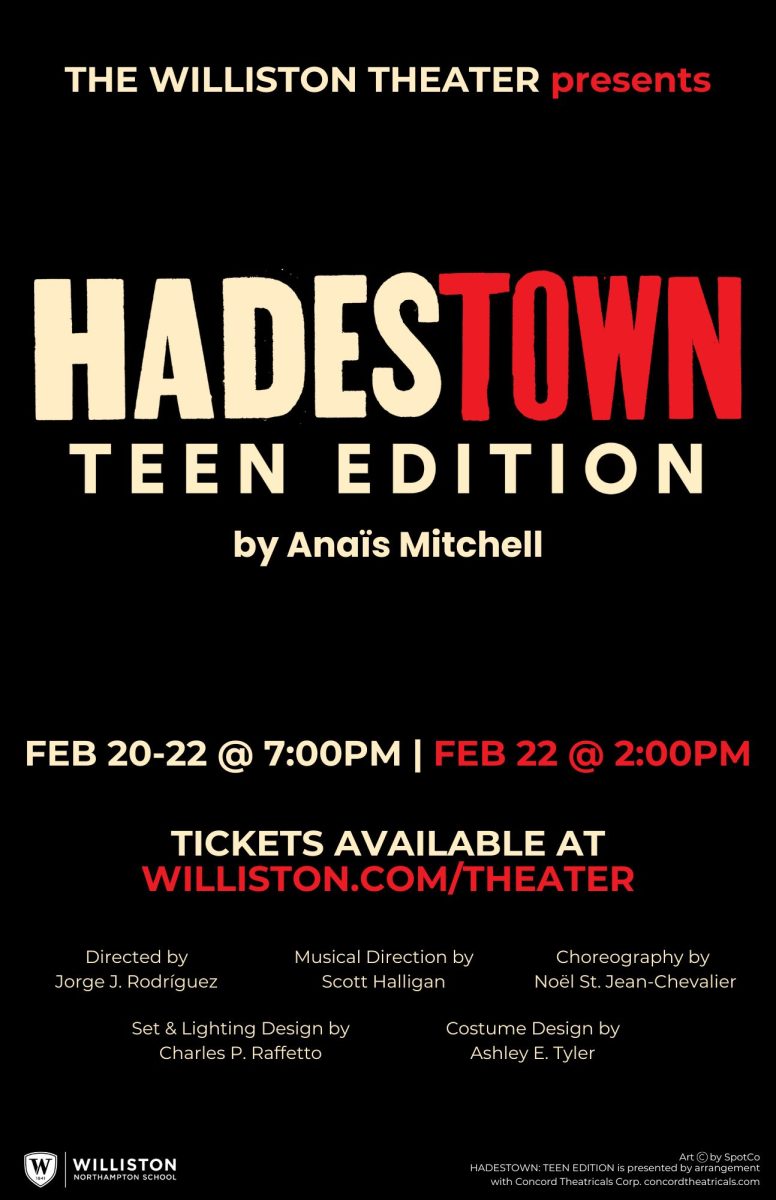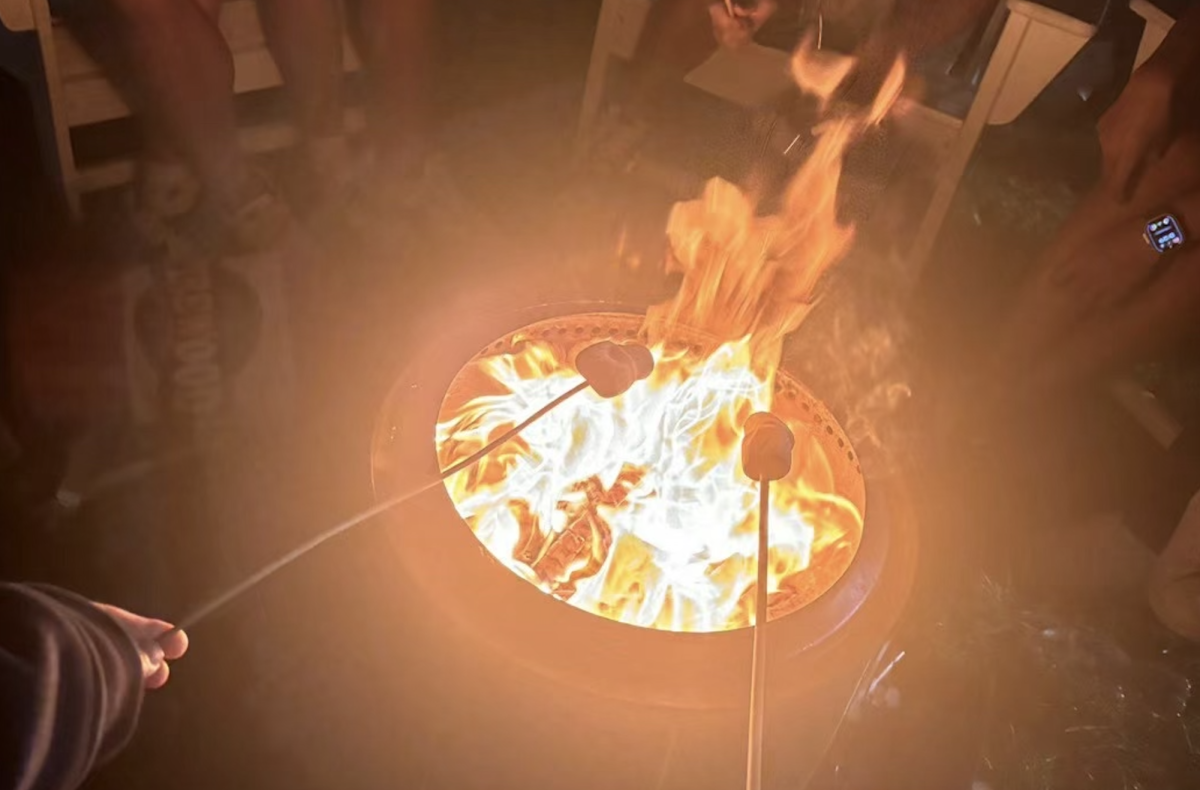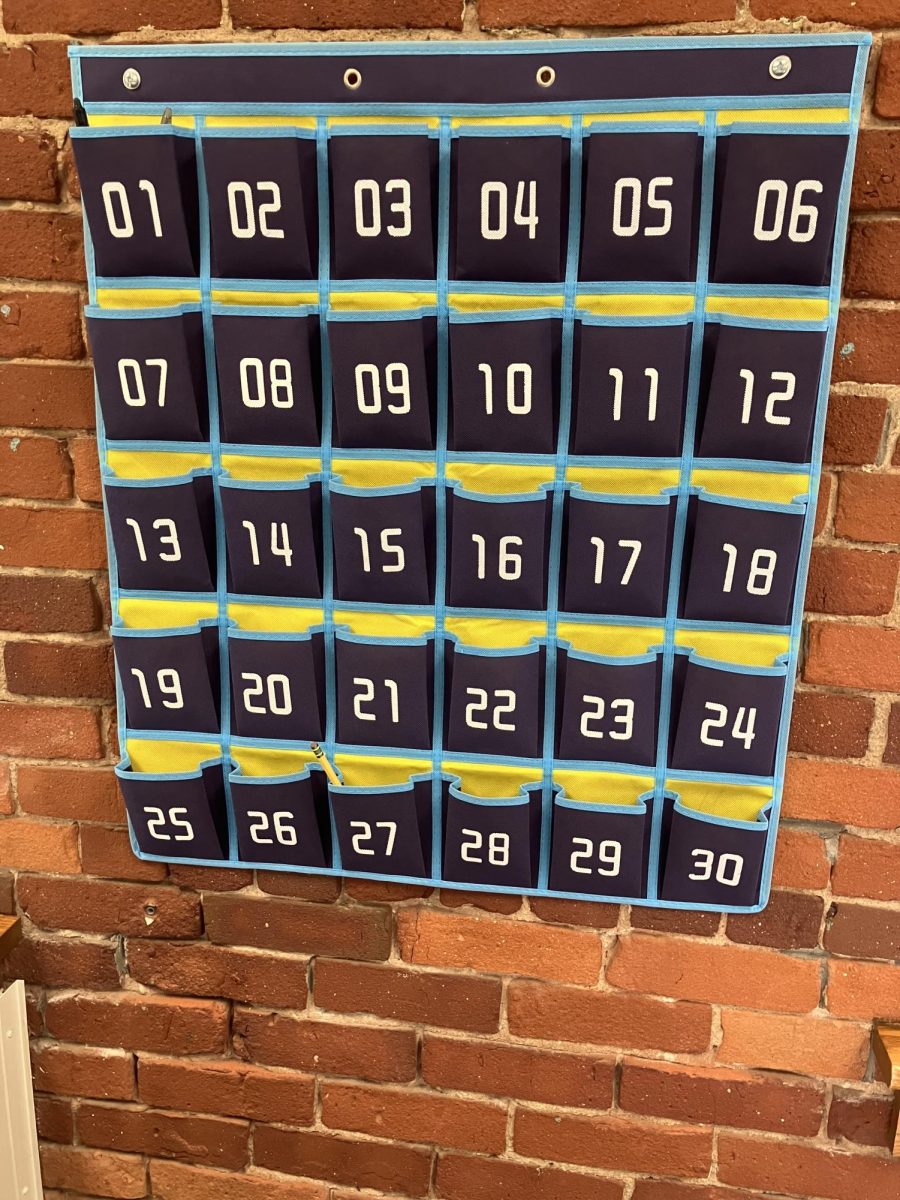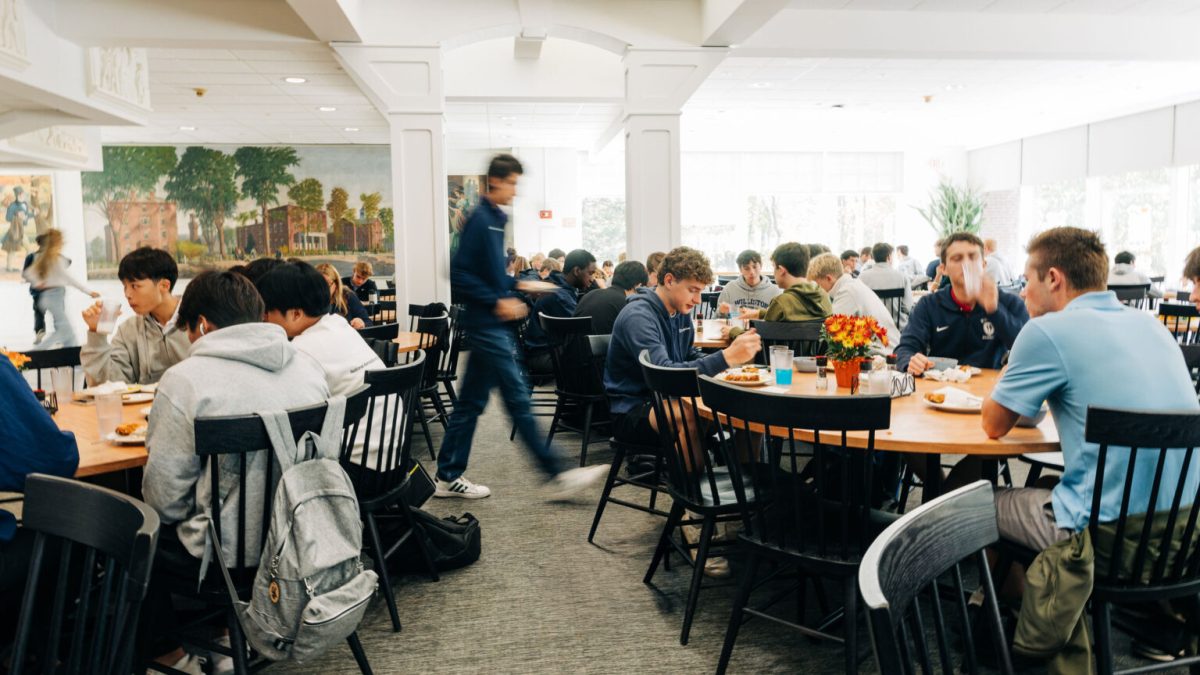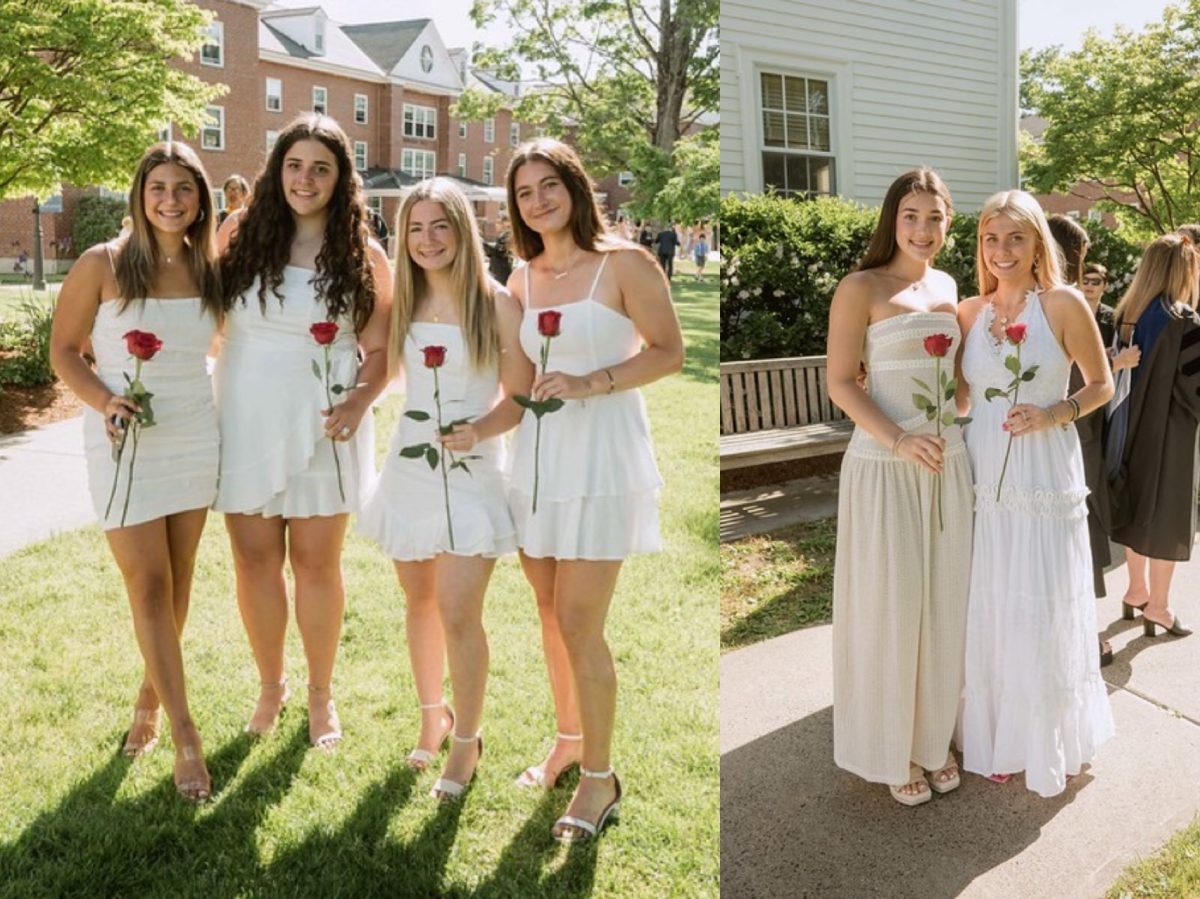As Williston begins the second half of the winter trimester, the production of the renown musical Hadestown: Teen Edition continues to develop as the cast and crew prepare for opening night.
Williston Theater will perform Hadestown from Feb. 20 to Feb. 22 at the Scott Hall Theater. Cast members, stage crew, and supporters of the Williston Theater alike are buzzing with both nerves and excitement about the upcoming performance. Hadestown may prove to be quite the enrichment for those unfamiliar with musical theater as the show is known to capture the audience with its musical mix of blues, folk, and New Orleans jazz, incorporated into its setting of Greek mythology.
Hadestown is a musical as well as a book by Anais Mitchell about the Greek tragedy of Orpheus and Eurydice. Hadestown was first performed on Broadway on April 17, 2019. Known for its popular soundtrack, including “Wait For Me (Reprise)” that takes place moments before the tragedy, the musical is also known for the famous lead actors and actresses who have stepped into the main roles on Broadway, namely Eva Noblezada and Jordan Fisher, as well as “The Summer I Turned Pretty” actress Lola Tung.
Students, faculty, and family within the Williston community may have a lot to learn from watching the performance — the show’s representation of societal issues is one of the many praises sung by members of Williston’s cast and crew about Hadestown.
“I really enjoy the powerful message it conveys. Its themes of classism, inequality, and power dynamics are especially relevant in today’s world, especially considering the recent news and ongoing societal issues. The musical shines a light on the disparity between the haves and the have-nots, and how those in power often remain blind to the suffering of the less fortunate,” said Aster Carlstrom, a senior who plays the role of both Assistant Director and Stage Manager in the production.
“These themes feel incredibly timely, as they encourage us to reflect on how privilege, wealth, and status impact our world and the lives of others,” he said. “The struggle of Orpheus and Eurydice, and the choices they make, mirror the real-world struggles many face today, where the wealthy often remain disconnected from the harsh realities that others endure.”
Additionally, senior Sako Lively, who has participated in the Williston Theatre program for four years, says that the themes and music of Hadestown contribute to its uniqueness.
“Hadestown is most unique for its style of music and because its content discusses deeper topics than most other production that I’ve been in, and it does so in a very captivating and often subtle way,” he said. “Most of the lines in Hadestown intentionally contain meaning that pertains to the plot but also to contemporary issues such as climate change, systemic racism, poverty, and economic systems.”
Sako describes himself as a long-time fan of Hadestown.
“I love the wide range of vocal ranges in the musical and the way that it discusses modern issues,” he said. “I believe that it deserves its spot as one of the most popular Broadway musicals and I appreciate that it appeals to a wider/different audience than most other musicals.”
There comes a certain responsibility with performing and adapting a show as unique and reputable as Hadestown, according to Sako.
“Much of the music and dialogue in Hadestown has a strong connection to traditionally black music and some of the parts are specifically intended to be played by Black actors and include Black vernacular,” he said.”
“I believe that it is ok for a predominantly non-Black ensemble (such as Williston’s) to perform Hadestown because the characters will always be different on stage depending on the actor who plays them,” he said. “That being said, I also believe that it is our responsibility to avoid imitating the musical’s Broadway actors and create our own interpretations of each written part that are accountable and representative of both the musical and our own personalities and backgrounds.”
Aside from Hadestown‘s reputation in the Broadway world, the show is a big deal this year because of its contrast between the several recent winter musicals.
Dr. Jorge Rodriguez, director and producer of Williston’s production, compares Hadestown to the musicals Williston has performed in the last three years.
“The two biggest differences are that this is a sung-through musical and a tragedy. Our most recent productions… Mamma Mia!, The SpongeBob Musical, and Something Rotten – have been book-driven, with plenty of dialogue, all comedies, and all based on existing properties: the ABBA music catalog, a cartoon show, and Shakespeare’s plays,” he said.
“Hadestown is an adaptation of a Greek myth, but it’s rendered new thanks to its music and setting. It’s also different in that it’s still playing on Broadway,” he said. “Most shows only become available for other groups to stage when they have closed and are no longer touring. So it’s a very exciting opportunity to stage this while it’s still popular on Broadway.
Dr. Rodriguez’s co-director, Aster, agrees, saying that “Hadestown is a sung-through musical, which is a bit of a shift for us. We were supposed to do Les Mis before the pandemic, but it didn’t happen, so for most of us, this is the first time we’re tackling a show like this.”
Aster says that vocals are not the only challenge the ensemble is taking on this year as well, adding to the expression of the show.
“Another difference is how we’ve really stepped up the dance numbers. We have a dance ensemble that adds an extra layer to the storytelling, even in moments that aren’t explicitly written into the script,” he said. “This has allowed us to be creative in how we present the material, and our dance ensemble has been amazing in bringing these moments to life.”
Dr. Rodriguez agrees saying, “We have a trio of amazing dance captains – Sadie, Maya, Wakanda – who are all doing amazing work as dancers in the show and also have proven phenomenal resources for their castmates.”
Still, the complexity and uniqueness of Hadestown is a feat that the Williston Theater ensemble is conquering well, thanks to the group’s tenacity and love for the program.
Dr. Rodriguez offers a director’s perspective on the cast’s take on the show’s challenges.
“It’s always daunting to take on so much material, but they all seem to be doing so with gusto. It’s been great to see their satisfaction when they successfully complete a number that’s been particularly difficult before,” he expresses.
Aster and Sako, while playing different roles as assistant director/stage manager and actor, agree that the essential hard work and high effort only makes the experience more rewarding.
“My favorite part of rehearsals is hearing a great song take on 80-90% of its final form in terms of singing, acting and dancing,” Sako said. “When I see such numbers already so presentable I become more excited (somehow) about the actual performances to come. There were many numbers like this in our act one run-through and it makes me more optimistic about the final product… I think we all love the musical. It is always a very fun an rewarding process for me and I believe that the good vibes are infecting everyone.”
Aster says, “Even though it means a lot of extra time and effort both in and out of rehearsals—working on blocking charts, reviewing schedules, and collaborating with Dr. Rodríguez on ideas—I genuinely enjoy it. The process of creating a show, seeing it come together, and knowing I’m contributing to something bigger is really fulfilling for me. It’s exactly what I want to be doing in my career, and I’m excited to keep learning and growing through this experience.”



